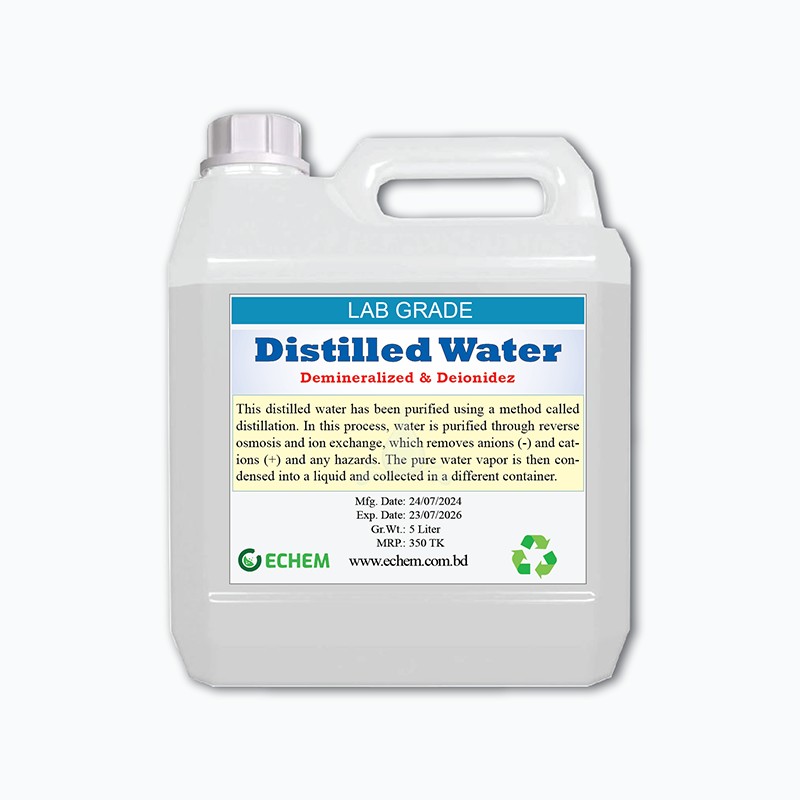Lab grade distilled water is a crucial resource in scientific research and laboratory applications due to its high purity. Produced through a meticulous distillation process, it eliminates impurities, minerals, and organic compounds, ensuring reliability and consistency. This type of water is indispensable in fields requiring precise and uncontaminated water, such as analytical chemistry, biology, and instrument calibration. Its stringent quality control makes it suitable for sensitive experiments and procedures, where even trace contaminants can affect outcomes. Proper handling and storage are essential to maintain its purity and effectiveness.
Description of Lab Grade Distilled Water
- Purity: Lab grade distilled water is highly purified, free from dissolved minerals, organic compounds, and contaminants, making it suitable for sensitive laboratory applications.
- Distillation Process: It is produced through a rigorous distillation process that involves boiling water and condensing the steam to remove impurities and contaminants.
- Usage in Experiments: Essential for experiments requiring high levels of purity, such as chemical reactions, biological experiments, and calibration of instruments.
- Chemical Composition: Consists solely of H₂O molecules with negligible amounts of other substances, ensuring consistency and reliability in experiments.
- Storage: Typically stored in clean, non-reactive containers to prevent contamination and maintain its high purity over time.
- pH Level: Neutral pH (around 7) due to the absence of dissolved salts and other impurities that could alter its acidity or alkalinity.
- Conductivity: Very low electrical conductivity, indicating minimal presence of ions and making it ideal for use in analytical and biochemical applications.
- Certification: Often comes with certifications or quality guarantees to ensure it meets specific standards required for laboratory use.
Usage Recommendations
- Analytical Chemistry: Use lab grade distilled water in analytical chemistry to prevent interference from impurities, ensuring accurate and reliable results.
- Biological Experiments: Essential for cell culture, microbiology, and molecular biology experiments to avoid contamination that could affect biological processes.
- Instrument Calibration: Use it to calibrate laboratory instruments and devices to maintain their accuracy and performance.
- Solution Preparation: Prepare chemical solutions, buffers, and reagents with distilled water to ensure consistency and reproducibility in experiments.
- Cleaning Laboratory Equipment: Use it to rinse and clean laboratory glassware and equipment to prevent contamination from tap water residues.
Cautions When Using Lab Grade Distilled Water
- Contamination: Once the container is opened, the water can easily become contaminated from the environment or handling, compromising its purity.
- Storage Conditions: Improper storage conditions, such as exposure to air or reactive materials, can lead to contamination or changes in its chemical properties.
- Compatibility: Ensure that the distilled water is compatible with all laboratory equipment and materials used, as some materials may react with even trace contaminants.
Lab grade distilled water is a quintessential element in scientific research and laboratory applications. Its unparalleled purity is achieved through a meticulous distillation process, making it indispensable for experiments and procedures that demand an uncontaminated medium. This highly purified water ensures consistent and reliable results, free from the influence of impurities that could alter experimental outcomes. Proper storage and handling are crucial to maintaining its pristine quality, thereby safeguarding the integrity of scientific investigations.
Features
- Unrivaled Purity: Ensures an exceptionally high level of purity, free from dissolved minerals, organic compounds, and other contaminants.
- Meticulous Distillation: Produced through an exacting distillation process that effectively removes impurities and foreign substances.
- Experimental Fidelity: Maintains the fidelity of experimental results by providing a consistently uncontaminated medium.
- Pure Molecular Composition: Composed exclusively of H₂O molecules, with minimal presence of other substances, ensuring chemical consistency.
- Inert Storage: Stored in non-reactive, inert containers to prevent any potential contamination and preserve its pristine quality.
- Neutral pH Balance: Maintains a neutral pH of approximately 7, ensuring no interference with the chemical properties of experimental reagents.
- Low Electrical Conductivity: Exhibits very low electrical conductivity, indicating the absence of ions, which is crucial for analytical and biochemical applications.
- Certified Quality Assurance: Accompanied by certification and quality assurance to meet the stringent standards and specifications required for laboratory use.

Login To Comment